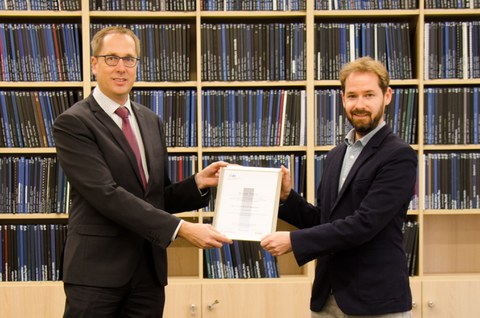Dec 09, 2020
WAK Award 2020 for ILK scientist

Überreichung der Urkunde von WAK-Mitglied Prof. Dr. Maik Gude an Dr. Michael Stegelmann
The Scientific Working Group of University Professors of Plastics Technology (WAK) annually awards prizes for the best scientific work in the field of plastics technology. This year, ILK scientist Dr. Michael Stegelmann was delighted to receive the Brose Prize for new processes and techniques in plastics processing. In his dissertation entitled "On the extrusion of amorphous high-performance thermo-plastic pipes with variable wall thickness", Dr. Stegelmann made a significant contribution to enabling extrusion technology for the variable production of aerospace piping systems.
In high-tech fields of application, such as aviation, lightweight construction technologies based on high-performance polymers create enormous potential for sustainable mass reduction. In connection with the increasing volume of aviation and the associated production of aircraft, there is a need for completely new production architectures with levels of automation that have not been common in this industry until now. This is why classic, highly automated and mass-producible plastics processing methods such as injection molding or extrusion are becoming increasingly interesting. The challenge here is the implementation of a component manufacturing process that meets the high demands of aviation and offers a wide range of variants, as well as the reproducible processing of high-performance polymers.
In this context, Dr. Michael Stegelmann has developed novel, analytical design models which for the first time allow to predict the process limits for variable process control on the basis of the polymer's extensional rheological properties. This makes it possible to cover the high product variety of piping systems in the aviation industry with economically reasonable utilization of the plant technology. The resulting increase in the variability of production technology is a major trend in mechanical and plant engineering in the plastics industry, in order to achieve a higher degree of individuality of the products while exploiting the high output rates.
